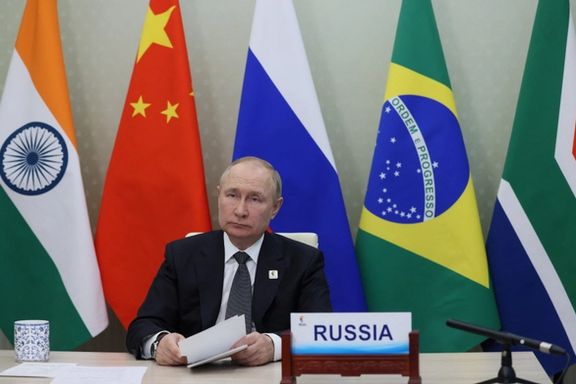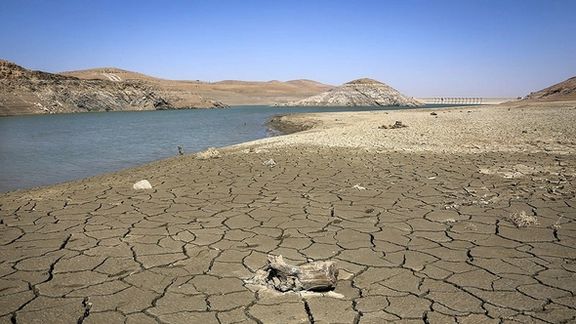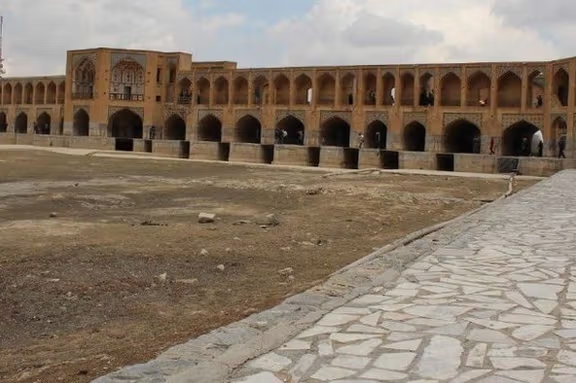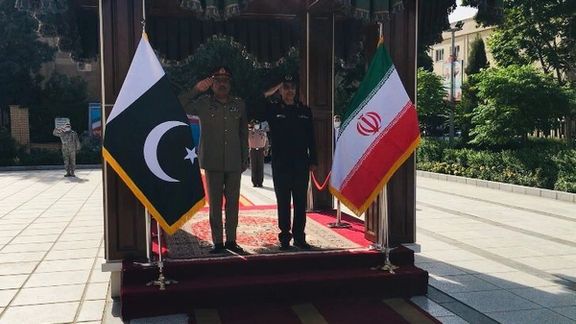Amid Sanctions, Iran Applies To Join BRICS Group

Iran has applied to become a member in the group of emerging economies known as the BRICS, Russia and Iran’s foreign ministry said on Monday.

Iran has applied to become a member in the group of emerging economies known as the BRICS, Russia and Iran’s foreign ministry said on Monday.
Iran's membership in the BRICS group, which includes Brazil, Russia, India, China and South Africa, "would result in added values for both sides," Iran's Foreign Ministry spokesperson said.
Russian Foreign Ministry spokeswoman Maria Zakharova said separately that Argentina had also applied to join the group. Argentinian officials could not be reached for immediate comment.
Argentina's President Alberto Fernandez, currently in Europe, has in recent days reiterated his desire for Argentina to join BRICS.
"While the White House was thinking about what else to turn off in the world, ban or spoil, Argentina and Iran applied to join the BRICS," Zakharova wrote on the Telegram messaging app.
Both Iran and Russia are under wide-ranging international and US sanctions, looking for ways to expand trading ties to survive export bans.
Russia has long been pushing to forge closer ties with Asia, South America and the Middle East, but it has intensified its efforts recently to weather sanctions imposed by Europe, the United States and other countries over its invasion on Ukraine.
Iran has long espoused closer ties with “the East”, meaning China and Russia as it has continued nuclear and ballistic missile programs seen as threats by the United States and several regional countries.
The BRICS is not a formal alliance, but a nascent international grouping intended to expand the power of emerging economies in larger international organizations such as the International Monetary Fund and the World Bank.

Iran is the tenth producer of crude steel in the world, but the industry with a high demand for water is seriously threatening the country’s scarce resources.
Most of Iran's largest steel factories are located in arid regions such as Esfahan, Yazd, and Kerman provinces despite the very high water use in steel production. 97 percent of Iran’s land is arid or semi-arid.
To produce every metric ton of steel, the industry in Iran uses 230,000 liters of water. According to official figures, the steel industry uses around 70 percent of water reserves of dams, leaving only 30 percent for other industries, agriculture, and urban use.
According to the head of Iran’s National Standards Organization, the industry uses 60 percent more electricity to produce one metric ton of crude steel in comparison with developed countries. The annual wastage of electricity in the industry is around 24 billion KW/H.
At the height of cold and hot months, steel mills have to cope with electricity outages, as usage in Iran is far more than what it can produce. This month, there are reports of industrial plants including steel production shutting down intermittently due to electricity shortages.
The rapid growth in demand for water in Iran – resulting from the growth of population, agriculture, and industries -- has led to severe depletion of available water. The annual renewable water availability per capita reached a crisis level in 2021. Studies by the United Nations Development Program (UNDP) indicate that by 2040 Iran is likely to face a severe water stress level.

According to official figures, in December 2021, the volume of water stored behind the country's dams had dropped by 44% in comparison with the same month in the previous year.
Iran is also among the ten countries in the world that extract most groundwater and a hotspot of land subsidence induced by groundwater withdrawal. Ground subsidence has become a serious threat in 18 out of the 31 provinces of Iran and has become a threat to around a quarter of Iran’s urban population.
Hydro-electric electricity production amounts to 15 percent of Iran’s total electricity production which also dropped by around 40 percent in the previous calendar year (ended March 20, 2022) in comparison with the previous year mostly due to drought.
According to the World Steel Association (WSA), Iran produced over 28 million metric tons of steel in 2021, putting it just behind Brazil. The country, however, ranked 15th in net exports.
Iran is planning to produce 32 million metric tons of steel in the current Iranian calendar year (ending March 20, 2022) and authorities hope to climb to the seventh place among the world’s top steel producers by the 2025.
Production of all the top ten suppliers, including top steelmaker China, declined in the first 5 months of 2022, except India that had an increase of 6.5 percent. But Iran had the highest drop.
The steel industry has highly contributed to the drying of Zayandeh Roud river in Esfahan Province and seriously damaged agriculture in the region, giving rise to water protests in the past year.
Amid United States' sanctions on Iran's oil exports, steel is one of the main exports earning foreign currency for the government, which faces a serious financial crunch.

Iran’s foreign minister has traveled to Turkey to bolster ties with Ankara amid Israel’s repeated warnings about terror plots by the Revolutionary Guard against Israeli citizens there.
Hossein Amir-Abdollahian held a joint press conference with his Turkish counterpart Mevlüt Çavuşoğlu before he held a meeting with President Recep Tayyip Erdoğan on Monday.
Amir-Abdollahian, whose plans to visit Ankara had earlier been cancelled twice because of IRGC's plot to harm Israelis in Turkey, said during the presser that, “We consider the fake Israeli regime as the number one enemy of Muslims and the Islamic world.”
Earlier in June, Turkey reportedly warned the Islamic Republic against attacking Israelis in Turkey, saying it is not prepared to allow Iran to use its territory to carry out acts of terrorism against other nations.
According to Iran’s top diplomat, the EU's foreign policy chief’s recent trip to Iran was also discussed with his Turkish counterpart. “I briefed my brother Mr. Cavusoglu on the visit to Tehran by Mr. Josep Borrell... and our agreement to continue negotiations on the removal of sanctions. We hope that in the new round of the negotiations between Iran and the other parties we will achieve a final agreement, if the United States and three European countries act realistically.”
He told reporters that Tehran would not oppose a new proposed Turkish military operation targeting Kurdish forces in Syria, saying that “We understand Turkey’s security concerns very well.”

Iran says Israel’s integration into the US Central Command (CENTCOM) and its participation in joint military drills with regional countries constitute a great threat to the Middle East.
Chairman of the Chiefs of Staff of the Iranian Armed Forces Major General Mohammad Baqeri made the remarks on Monday during a meeting with his Pakistani counterpart Lieutenant General Nadim Reza Nishan, noting that “Iran will not tolerate such threats and will certainly respond to them.”
Describing Israel as a destabilizing force in the region, he said, “The regime, through the implementation of certain plots, seeks to forge relations with regional countries and achieve its interventionist goals.”
Last week, Israeli Defense Minister Benny Gantz said, “I have been leading for the past year together with my colleagues at the Pentagon and the [Biden] administration an extensive program to strengthen cooperation between Israel and the countries of the region, under American leadership and CENTCOM.” “Part of that vision is what I call MEAD, Middle East Air Defense, which we are building amid Iran’s attempts to hit the region’s countries with rockets, cruise missiles and UAVs [unmanned aerial vehicles, or drones].”
Israel is improving relations with the Persian Gulf monarchies especially since the 2020 ‘normalization’ agreements with Bahrain and the UAE, arguing they face a common threat in Iran.
Seriously concerned about the growing ties, the Islamic Republic has repeatedly warned neighbors against allowing Israel to establish presence in the Persian Gulf.
Iran's IRGC Navy commander said earlier in June if for whatever reason someone allows “the number one enemy” into the Persian Gulf, it will create “chaos and instability” both for itself and for the region.

Former senior lawmaker Ali Motahari has lashed out at Iran’s foreign minister over his remarks about Russia to benefit from the revival of the 2015 nuclear agreement.
Motahari, a social conservative who has often criticized hardliners in recent years, said on twitter on Sunday that the JCPOA (Joint Comprehensive Plan of Action) has nothing to do with Russia and Moscow does not have the right o benefit from it.
His reaction was to a sentence by Hossein Amir-Abdollahian, who told Croatian daily Večernji List in a recent interview that Russia has demanded that if the JCPOA were to be restored, the agreement should also benefit Russia as a party that has taken constructive measures for its revival.
Motahari criticized the sentiment, saying that “Is Iran one of the Russian Commonwealth of Independent States or a Russian colony whose interests are tied to Russia's interests?”
“Russia has taken its share of interests from Iran and its territory years ago with the annexation of Azerbaijan, Georgia and Armenia,” he said referring to the early 19th century, adding that “it is not necessary that Russia takes advantage of the JCPOA too.”
Pundits in Tehran say Russia supports the revival of the nuclear deal but wants tensions to continue between Iran and the West.
Vienna talks were almost completed in March before Russia demanded a US guarantee that sanctions for its invasion of Ukraine should not hurt its trade with Tehran.
If finalized, the renewed nuclear agreement between Iran and world powers lets Russia cash in on a $10-billion contract to build atomic reactors in Iran.

The government in Iran is intensifying social restrictions, including closing cafés and detaining women for “improper” hijab, reports on social media indicate.
Latest news received from the southern historic city of Shiraz say that security forces and ‘morality police’ shut down several cafés and are pressuring others to strictly enforce hijab rules. The same process is taking place in other cities, including Tehran.
The hijab or morality police have also expanded patrols in streets, stopping women they believe are not wearing their headscarves properly or for other dress code violations. These law enforcement units are all accompanied by special vans, and they push women into these vehicles for further questioning, admonishment, or arrest.
There have been many recorded incidents in recent months showing women resisting the morality police who use force to push them into their patrol vans. One journalist in Tehran tweeted on Monday that morality police are using new tactics to convince women to enter the vans without making a bigger scene in public. Reportedly, authorities while they have decided to harass citizens are also concerned about a backlash and incidents that could lead to street protests.
A video that went viral on June 23 showed dozens of teenage boys and girls in Shiraz congregating in a park and mingling freely, which is forbidden according to the Islamic rules in the country. Most of the girls had no headscarves and the incident turned into a major issue.
The government immediately announced that the organizers of the gathering were arrested while many ordinary Iranians on social media expressed satisfaction that teenagers defy the religious rules.
One Shiraz resident complained on social media that authorities are taking away what little exists for relaxation and socializations, by closing down cafés.
Another viral video on Sunday [June 26] showed a woman screaming profanities at a cleric who stopped her in a supermarket to admonish her for inadequate hijab. Some on social media commented that clerics do not object to doubling and tripling of prices in a matter of weeks but are upset by hijab infringements.
Young people in Tehran are also complaining about increasing pressure on café owners not to force clients with loose headscarves to cover their heads properly. There are also reports about taxi drivers telling women to cover themselves properly, out of concern that they would be stopped by the police.
In recent weeks, the economic situation in Iran has deteriorated with prices of daily necessities doubling and tripling almost overnight and protests breaking out around the country.
No one knows if the enforcement of strict religious rules is related to the authorities trying to show force, but some citizens see the effort as a scheme to pit people against one another.
Massoud Jafari, a café owner twitted that he is constantly harassed by morality police who walk in anytime they want and accuse him of running a business promoting “prostitution”, insulting him and his customers.
Last week, 120 people touring a nature reserve were arrested and accused of dancing and drinking alcohol.
There is also pressure on female singers who entertain in private wedding parties. One local prosecutor in Hormozgan province on Sunday announced the arrest of four female singers. “If these acts continue, both the performers and persons organizing the wedding party will be arrested,” he announced.